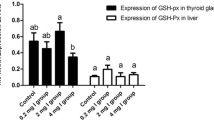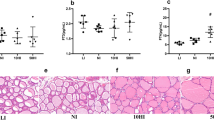Abstract
As excessive iodine intake is associated with a decrease of the activities of selenocysteine-containing enzymes, supplemental selenium was hypothesized to alleviate the toxic effects of excessive iodine. In order to verify this hypothesis, Balb/C mice were tested by giving tap water with or without potassium iodate and/or sodium selenite for 16 weeks, and the levels of iodine in urine and thyroid, the hepatic selenium level, the activities of glutathione peroxidase (GSHPx), type 1 deiodinase (D1), and thyroid peroxidase (TPO) were assayed. It had been observed in excessive iodine group that hepatic selenium, the activities of GSHPx, D1, and TPO decreased, while in the groups of 0.2 mg/L, 0.3 mg/L and 0.4 mg/L supplemental selenium, the urinary iodine increased significantly. Compared with the group of excessive iodine intake alone, supplemental selenium groups had higher activities of GSHPx, D1, and TPO. We could draw the conclusion that supplemental selenium could alleviate toxic effect of excessive iodine on thyroid. The optimal dosage of selenium ranges from 0.2 to 0.3 mg/L which can protect against thyroid hormone dysfunction induced by excessive iodine intake.

Similar content being viewed by others
Abbreviations
- GSHPx:
-
glutathione peroxidase
- TPO:
-
thyroid peroxidase
- D1:
-
type 1 deiodinase
- H2O2 :
-
hydrogen peroxide
- NI:
-
normal controls
- EI:
-
excessive iodine group
- IS groups:
-
selenium groups
- T4 :
-
thyroxine
- T3 :
-
triiodothyronine
References
Stubbe P, Schulte FJ, Heidemann P (1986) Iodine deficiency and brain development. Bibl Nutr Dieta 38:206–208
Chen Z, Liu D, Yang Y (1998) High iodine region and endemic iodine-induced goiter. Chin J Endemiol 17:385–386
Markou K, Georgopoulos N, Kyriazopoulou V, Vagenakis AG (2001) Iodine-induced hypothyroidism. Thyroid 11:501–510
Roti E, Uberti ED (2001) Iodine excessive and hyperthyroidism. Thyroid 11:493–500
Tonglet R, Bourdoux P, Minga T, Ermans AM (1992) Efficacy of low oral doses of iodized oil in the control of iodine efficiency in Zaire. N Engl J Med 326:236–241
John RA, Fergus N, Geoffrey JB (1993) Selenium deficiency, thyroid hormone metabolism, and thyroid hormone deiodinases. Am J Clin Nutr 57:236S–239S
Xu J, Yang XF, Guo HL, Hou XH, Liu LG, Sun XF (2006) Selenium-supplement alleviated the toxic effects of excessive iodine in mice. Biol Trace Elem Res 111:229–238
Fischer PWF, L’Abbe MR, Giroux A (1986) Colorimetric determination of total iodine in foods by iodide-catalyzed reduction of Ce4+. Anal Chem 69:687–689
Watkinson IH (1966) Fluorometric determination of selenium in biological material with 2, 3-diaminonaphthalene. Anal Chem 38:92–97
L'Abbe MR, Trick KD, Beare-Rogers JL (1991) Dietary (n-3) fatty acids deficiency may affect rat heart, liver, and aorta protective enzyme activities and lipid peroxidation. J Nutr 121:1331–1340
Christine SH, Barthlomeus B, Dennis WF, Mary RL (1996) A method for the determination of type I iodothyronine deiodinase activity in liver and kidney using 125I-labelled reverse triiodothyronine as a substrate. Clin Biochem 29:451–456
Hebron CC, Daniel RD (2000) Dietary genistein inactivates rat thyroid peroxidase in vivo without an apparent hypothyroid effect. Toxicol Appl Pharmacol 168:244–252
Zhao J, Wang P, Shang L, Sullivan KM, van der Haar F, Maberly G (2000) Endemic goiter associated with high iodine intake. Am J Public Health 90:1633–1635
Camargo RY, Tomimori EK, Neves SC, G-S-Rubio I, Galrao AL, Knobel M, Medeiros-Neto G (2008) Thyroid and the environment: exposure to excessive nutritional iodine increases the prevalence of thyroid disorders in Sao Paulo, Brazil. Eur J Endocrinol 159(3):293–299
Laurberg P, Bulow PI, Knudsen N, Ovesen L, Andersen S (2001) Environmental iodine intake affects the type of nonmalignant thyroid disease. Thyroid 11:457–469
Herzog V (1984) Pathways of endocytosis in thyroid follicle cells. Int Rev Cytol 91:107–139
Brix K, Linke M, Tepel C, Herzog V (2001) Cysteine proteinases mediate extracellular prohormone processing in the thyroid. Biol Chem 382:717–725
Akinci M, Kosova F, Cetin B, Sepici A, Altan N, Aslan S, Cetin A (2008) Oxidant/antioxidant balance in patients with thyroid cancer. Acta Cir Bras 23(6):551–554
Howie AF, Walker SW, Akeson B, Arthur JR, Beckett GJ (1995) Thyroidal extracellular glutathione peroxidase: a potential regulator of thyroid hormone synthesis. Biochem J 308:713–717
Vrca VB, Skreb F, Cepelak I, Romic Z, Mayer L (2004) Supplementation with antioxidants in the treatment of Graves disease; the effect on glutathione peroxidase activity and concentration of selenium. Clin Chim Acta 341(1–2):55–63
Zagrodzki P, Ratajczak R (2008) Selenium supplementation in autoimmune thyroiditis female patient—effects on thyroid and ovarian functions (case study). Biol Trace Elem Res 126(1–3):76–82
Beckett GJ, Beddows SE, Mourrice PC, Nicol F, Arthur JR (1987) Inhibition of hepatic deiodinase of thyroxine is caused by selenium deficiency in rats. Biochem J 248:443–447
Acknowledgment
We gratefully acknowledge the financial support of the National Natural Science Foundation of China (No. 30771806) and Medical Science Foundation of Guangdong (Nos. A2008623 and A2009607).
Author information
Authors and Affiliations
Corresponding author
Rights and permissions
About this article
Cite this article
Xu, J., Liu, XL., Yang, XF. et al. Supplemental Selenium Alleviates the Toxic Effects of Excessive Iodine on Thyroid. Biol Trace Elem Res 141, 110–118 (2011). https://doi.org/10.1007/s12011-010-8728-8
Received:
Accepted:
Published:
Issue Date:
DOI: https://doi.org/10.1007/s12011-010-8728-8




